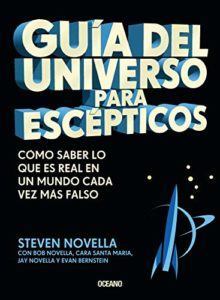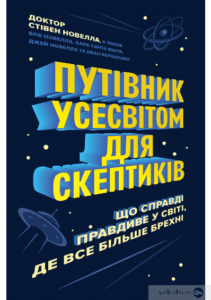Our Book | How to Know What’s Really Real in a World Increasingly Full of Fake | The Skeptics’ Guide to the Universe
Available Now!
An all-encompassing guide to skeptical thinking in the popular “The Skeptics Guide to the Universe” podcast’s dryly humorous, accessible style.
“Thorough, informative, and enlightening, The Skeptic’s Guide to the Universe inoculates you against the frailties and shortcomings of human cognition. If this book does not become required reading for us all, we may well see modern civilization unravel before our eyes.”—Neil deGrasse Tyson, Astrophysicist, American Museum of Natural History
It’s intimidating to realize that we live in a world overflowing with misinformation, bias, myths, deception, and flawed knowledge. There really are no ultimate authority figures-no one has the secret and there is no place to look up the definitive answers to our questions (not even Google). But, by thinking skeptically and logically, we can combat sloppy reasoning, bad arguments and superstitious thinking. It’s difficult, and takes a lot of vigilance, but it’s worth the effort.
In this tie-in to their incredibly popular “The Skeptics Guide to the Universe” podcast, Steven Novella, MD along with “Skeptical Rogues” Bob Novella, Cara Santa Maria, Jay Novella, and Evan Bernstein will explain the tenets of skeptical thinking and debunk some of the biggest scientific myths, fallacies and conspiracy theories (Anti-vaccines, homeopathy, UFO sightings, etc.) They’ll help us try to make sense of what seems like an increasingly crazy world using powerful tools like science and philosophy. THE SKEPTICS’ GUIDE TO THE UNIVERSE is your guide through this maze of modern life. It covers essential critical thinking skills, as well as giving insight into how your brain works and how to avoid common pitfalls in thinking. They discuss the difference between science and pseudoscience, how to recognize common science news tropes, how to discuss conspiracy theories with that crazy coworker of yours, and how to apply all of this to everyday life.
So, are you ready to join them on an epic scientific quest, one that has taken us from huddling in dark caves to stepping foot on the Moon? (Yes, we really did that.) Like all adventures, this one is foremost a journey of self discovery. The monsters you will slay and challenges you will face are mostly constructs of your own mind. With the SKEPTIC’S GUIDE TO THE UNIVERSE, we can do this together.
Praise for the Skeptics’ Guide

Kirkus review
THE SKEPTICS’ GUIDE TO THE UNIVERSE
How to Know What’s Really Real in a World Increasingly Full of Fake
[STARRED REVIEW!]
Why and how to become a skeptic. Steven Novella (Clinical Neurology/Yale Univ. School of Medicine), a founding fellow of the Institute for Science in Medicine and host and producer of the titular science and critical thinking podcast, pulls no punches in his attack on the misinformation, myths, and biases that surround us. Aided here by several writing associates, the author demonstrates his vast experience explaining the mechanisms of deception and the tactics used by pseudoscientists. To prepare readers, Novella first shows the ways in which our memories are faulty and our perceptions fallible, the glitches in our brains that trip us up, and the many logical fallacies that screw up our thinking. In lively, highly accessible prose, he helps readers understand these peculiarities and limitations and learn how to recognize deceptive claims. Science, he writes, is “the process of making our best effort to know what’s really real.” His chapters are filled with examples of pseudoscience and deception, some of which are old chestnuts, such as the “Clever Hans” effect. Others include intelligent design, pyramid schemes, exorcism, conspiracy theories, ghosts, and witches. Inevitably, some of Novella’s examples will challenge some readers’ treasured beliefs, but their inclusion here makes the challenges especially effective. As the author makes clear, some false beliefs come around again and again; new ones, however, confront us daily. A section on skepticism and the media, which looks at the difficulties of reporting science well, is rich with examples of science journalism gone wrong in the age of the internet and social media. Of special interest is the chapter on false balance, the common practice of TV news programs and documentaries giving equal coverage to two points of view that do not, in fact, have equal credibility; his prime example is climate change scientists debating climate change deniers. Presented as “one giant inoculation against bad science, deception, and faulty thinking,” the book succeeds superbly.












